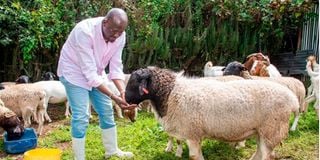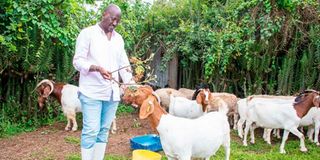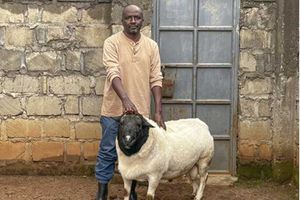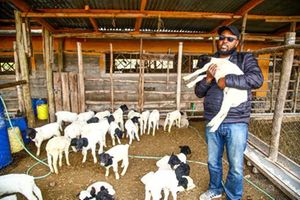
Joe Mwaniki, a Dorper sheep farmer in Subuku village Njoro Sub-county at his farm.
Many Kenyans are adopting Dorper sheep farming, specifically for meat. For Mifugo Falme Ltd founders Joe Mwaniki and Beatrice Macharia, however, breeding Dorper sheep is proving more lucrative as demand for the animal surges.
Their venture is in Subuku village, Njoro Sub-County, Nakuru.
There are more than 100 Dorper sheep at Mifugo Falme Ltd. The animals are defined by their unique characteristics – from structure, muscles, superior meat quality and having a short maturity period. They are also hardy and resistant to diseases.
“We first bought 20 indigenous sheep in Rumuruti in 2020. We, however, saw the need to upgrade in 2023 after realising that they took long to mature despite eating well,” Mwaniki says.
“There was no increase in weight, muscle and energy. We were actually making a loss. We then thought of getting distinctive breed that could give us superior offspring. Dorper sheep came to mind.”
He says traditional sheep breeds can take up to four years to mature, with the adult reaching just nine kilogrammes.
Mwaniki flew to South Africa where he bought two T5 rams, each for Sh250,000 and 11 ewes at Sh150,000 each.
“T5 is one of the best Dorper breeds in the world,” he says, adding that his intention was to produce pure Dorper.
“The Dorper sheep is hardy, can survive harsh environments and is resistant to diseases. It has an efficient mechanism for converting forage to quality meat. To cap it all, it grows fast and its maintenance is low.”
Proper nutrition across all the developmental stages is observed. Most of the 20-acre farm is reserved for fodder, which includes maize, super Napier and other grass.
Mwaniki and Macharia employ the free range method of raising the animals. The feed, containing maize germ and sunflower, is supplemented with silage, Lucerne grass and super Napier.
The lambs are given maize germ and soya.
“Lambs need a diet that is rich in protein for their growth. Gestating and lactating ewes are given additional nutrients for reproductive purposes,” Mwaniki says.

Joe Mwaniki, a Dorper sheep farmer in Subuku village Njoro Sub-county at his farm.
“A critical aspect of Dorper sheep farming is proper nutrition. The sheep thrive on a diet comprising mixtures of pasture, forage and supplemented feeds. One can also adopt an affordable and accessible feeding plan to cut costs.”
Mifugo Falme Ltd focuses on preventing, not treating, diseases. Vaccinating the sheep against ailments is mandatory.
“We engage the services of qualified animal health service providers to administer vaccines against pneumonia and bacterial infections,” Macharia says.
“Some vaccines are given two times a year while others are administered once. Deworming is every month. We deworm the animals more during rainy seasons.”
Mifugo Falme Ltd also pays attention to fleas.
“We cannot compromise on hygiene, especially in the sheds. We disinfect the sheds many times a week. Shoats are prone to external and internal parasites,” she says.
“However, some worms are getting resistant to known drugs. This is when the animal health service providers come in handy.”
She cites a dangerous worm known as hemonchus. One can produce as many as 10,000 eggs.
“If the droppings of a sheep have the eggs, it can affect the entire flock. The worm feeds on blood, making the animal anaemic. If not treated, the animal becomes weak and dies,” she says.
“This has meant that Mifugo Falme Ltd adopts an intense intervention that calls for using superior dewormers, iron shots for the loss of blood and multivitamin for the flock to regain appetite. We even transfer the animals to different sheds to kill the worm and eggs.”
Mwaniki says a potential sheep farmer should select a Dorper with good genes.
“Overstocking leads to stress in sheep. A stress-free Dorper sheep grows and matures fast,” the breeder says.
“One never stops learning in farming. We usually sell the upgraded lambs and make follow-ups with farmers. We buy the meat from them and export it to the United Arab Emirates.”










